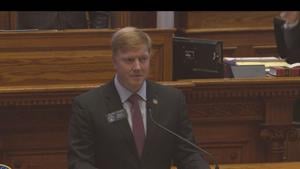(The Center Square) – As several states go to war with President Donald Trump, filing lawsuits against his directives — some prohibiting transgender athletes from competing against cisgender girls — one rural school district in the Pacific Northwest says it’s stuck between a rock and a hard place. It can either adhere to state law, risking millions in federal funding, or follow Trump’s lead, jeopardizing local support.
The Kennewick School District, nestled in the larger Tri-Cities area of Washington state, issued a news release Thursday, asking the U.S. Department of Education to step in. The night before, the local school board voted to send a letter to the agency ahead of a potential lawsuit.
The board laid out its plan to file a formal Title IX civil rights complaint against the Washington Office of the Superintendent of Public Instruction, or OSPI, Superintendent Chris Reykdal, and the Washington Interscholastic Activities Association, or WIAA, over state athletic policies.
“This is not equality — it’s erasure,” Board Vice President Micah Valentine argued in the news release. “Girls are losing titles, scholarships, and opportunities because state officials refuse to follow federal Title IX. I will not stand by while our girls are robbed of their opportunities.”
The letter cited a recent instance in Spokane Valley, Wash., where a transgender athlete won a girls’ state title, a result the board claims is unfair to cisgender women. The board alleged that the state and WIAA’s stance directly violates Trump’s Jan. 20 and Feb. 5 executive orders.
The directives focused on “biological truth,” restricting transgender participation in sports based on sex assigned at birth.
The board’s letter characterized the athlete’s participation as “demeaning, unfair, and dangerous” to girls competing this season. The letter argued that the Spokane athlete is denying those girls “the equal opportunity to participate and excel in competitive sports.”
The battle isn’t limited to Washington state, either. Trump recently went back and forth with Maine over its refusal to follow the Feb. 5 executive order, and student-athletes have filed lawsuits against the Trump administration over its policies.
Federal judges in Washington state blocked Trump’s orders around gender-affirming care for minors and transgender people serving in the military. Reykdal and OSPI have also mandated that the Kennewick School District revise its gender-inclusive policy to conform to the state’s.
“In doing so, Washington state and the State Superintendent, Chris Reykdal, have blatantly disregarded directives of the [DOE], and the lawful Executive Orders issued by our current President,” the board wrote in its letter, “creating discriminatory and unsafe environments detrimental to our children and particularly damaging to our girls and young women.”
According to the letter, if the district follows the state policy, violating its interpretation of Title IX and Trump’s orders, it could lose over $31.6 million in federal funding, 10% of its budget.
“Like most school districts, over 80% of our budgets are committed to staff salaries and benefits,” the letter reads, “a 10% loss of available funds would be absolutely devastating.”
“Our school board now faces a serious dilemma: Either the Kennewick School District complies with state mandates that put our federal funding in jeopardy, or it complies with Executive Orders … and risks retaliation from Washington State Officials,” the letter continued.
The board argued several conflicts threaten its ability to create a “safe and nondiscriminatory environment” for 18,000 students. To address the situation, it asked for assurance of federal funding if it follows Trump’s directives, whether his orders preempt state policies, and for the DOE and U.S. Department of Justice to investigate the state over potential Title IX violations.
In a statement to The Center Square, Reykdal argued Trump’s orders don’t override state law.
The superintendent emphasized state law prohibiting discrimination based on gender identity and stated his intention to take legal action if Trump pauses or withholds any federal funding.
“My job as the leader of this constitutional office is to communicate, uphold, and enforce the law,” Reykdal wrote. “An executive order is not law, and it does not override state law.”
He wrote that OSPI would continue to enforce current law until Congress directs otherwise or federal courts invalidate those policies. Reykdal repeated claims that Kennewick’s gender policies violate state law and civil rights guidelines for public schools.
“States are permitted to provide greater protections for students than what is required by federal minimum standards,” he concluded, “and Washington’s laws fit squarely within the scope of what is allowed by federal law.”
The Center Square contacted the government-funded Washington State LGBTQ Commission and transgender advocacy groups for comment but did not receive an immediate response.
“To the 2SLGBTQIA+ community: your state values you, your state wants you to be here, and your state will fight for your right to exist,” the commission wrote in a Feb. 21 news release. “As terrifying as these federal executive orders are, Washington state is committed and prepared to fight against discrimination and oppression from any administration.”
Gov. Bob Ferguson also weighed in on the controversies during a Feb. 13 press conference.
“The transgender community, in particular, is under attack right now,” Ferguson said. “As you know, if an individual’s sex assigned at birth is incongruent with their innate gender identity, this can cause varying degrees of gender dysphoria, a serious medical condition. That’s not a political opinion – that’s a medical fact.”
According to the letter, the Kennewick School Board told federal officials it “will not stand by” as Reykdal allegedly refuses to comply with Title IX. The Mead School Board, located near Spokane, Wash., also recently sent letters regarding the state’s athletic policies.
Erika Sanzi, director of Parents Defending Education, a group self-described as “working to reclaim our schools from activists imposing harmful agendas,” applauded Kennewick’s complaint against the state.
“I congratulate this school board for having the courage to stand up for basic fairness and the safety and dignity of the girls who have been failed by their state leadership,” Sanzi wrote in a statement to The Center Square. “Title IX guarantees single-sex spaces and athletic opportunity no matter how much the state’s leaders pretend that it doesn’t.”


















































